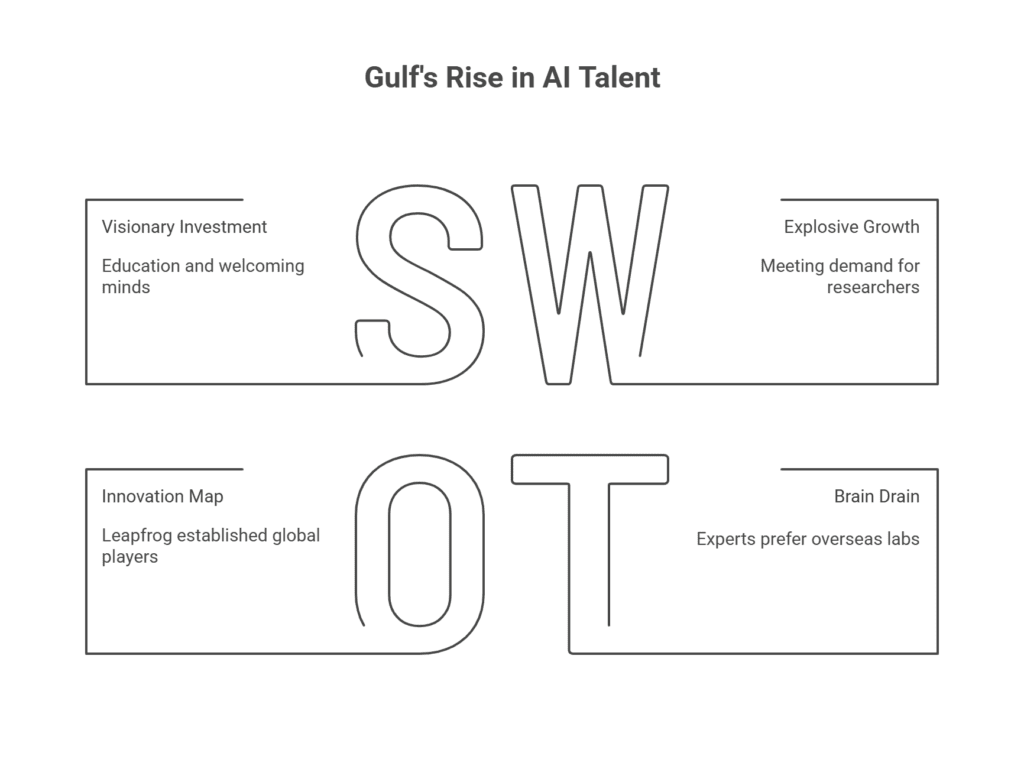Not long ago, names like Italy and Russia brought to mind visions of historic tech prowess, icons in a world of scientific breakthroughs, engineering marvels, and information age giants. But funny thing is, the world doesn’t stand still. On the world stage of artificial intelligence, there’s been a dramatic power shift that might surprise even industry insiders.
In 2025, for the first time, both the United Arab Emirates (UAE) and Saudi Arabia muscled their way into the top 20 global rankings for AI talent, leapfrogging over Italy and Russia, according to the latest Global AI Competitiveness Index released by the International Finance Forum and Deep Knowledge Group. Call it what you want, stunning, unexpected, or simply the logical next step for two nations obsessed with transforming their economies. Either way, it’s a turning point that’s impossible to ignore.
What’s Driving the Gulf’s AI Talent Boom?
It’s about more than just numbers. But let’s start there:
- UAE now holds 0.7% of the world’s AI talent pool, that’s 16th globally, and first across the Arab world.
- Saudi Arabia isn’t far behind at 0.4%, landing 19th worldwide, just ahead of Italy and Russia, both historically senior players in the technology sector.
Sure, at face value, these percentages might seem small. But step back: with about 3 million AI professionals worldwide (spanning researchers, developers, and data scientists), those slivers represent talent powerhouses, especially when viewed alongside the velocity of growth and the region’s massive investment in human capital and innovation.
How Did They Get Here? The Long Game of Vision and Investment
National AI Strategies: The Engine of Change

Both the UAE and Saudi Arabia embarked on national strategies aimed at making AI central to every strand of society, schools, universities, the workplace, and even government ministries. These plans weren’t spun from thin air. They came with real policy teeth and significant financial firepower.
- Saudi Arabia’s Vision 2030 puts artificial intelligence front and center, allocating $20 billion to AI investment, partnerships with global leaders like Stanford University, and the launch of institutions focused on data and digital transformation.
- The UAE’s AI Ecosystem is built on targeted talent development programs, executive education, and the world’s first dedicated AI university, Mohamed bin Zayed University of Artificial Intelligence (MBZUAI). Layer on generous grants, scholarships, and public training programs, and you get rapid upskilling at scale.
And let’s not forget the competitive pay: top scientists in Saudi Arabia reportedly command median annual salaries of $420,000, tax-free. For leading roles, especially within megaprojects like NEOM, signing bonuses can reach as high as $5 million.
Talent Meets Infrastructure: Universities & Training Centers Take Center Stage
Funny enough, what’s most striking isn’t just the Gulf’s eagerness to import global talent, it’s their resolve to grow new AI experts at home.
- King Abdullah University of Science and Technology (KAUST) in Saudi Arabia broke into the global top 150 for AI talent production, the highest slot for any institution in the Middle East. The campus, designed in partnership with Stanford, houses one of the world’s foremost AI research labs and has become a magnet for top minds from across the world.
- The UAE’s MBZUAI is setting new standards for computer science education and research, providing custom programs tailored to the future needs of the public and private sectors alike.
- National digital skills platforms and ambitious upskilling campaigns, like Saudi Arabia’s 10,000 Coders and the “One Million Prompters” initiative in the UAE, ensure a fast-expanding pipeline of AI-ready professionals. As of 2025, Saudi government programs had already trained more than 420,000 citizens in AI basics and advanced skills.
Top Universities Leading the Charge in the Middle East
- KAUST (Saudi Arabia): Highest-ranking Middle Eastern university globally for AI research talent, breaking barriers for the region and anchoring local capacity development.
- MBZUAI (UAE): The world’s first graduate-level, research-based artificial intelligence university, rapidly gaining international recognition and attracting students from over 80 countries.
National AI Initiatives: Concrete Steps Beyond the Hype
Sometimes, global rankings are nice, but the nuts and bolts matter more. Here’s where the real work happens:
- Saudi Arabia formed the Saudi Data and Artificial Intelligence Authority (SDAIA) to fast-track major projects, with expedited decision-making, sometimes as quickly as 30 days from proposal to green-light.
- The UAE’s Ministry of AI works across all government agencies and with industry partners to scale AI adoption from schools to hospitals to police forces.
- Public training: Saudi Arabia’s “SAMAI” initiative and the UAE’s “One Million Prompters” are turbo-charging the local workforce, ensuring ordinary citizens learn AI skills that, just a few years ago, were the preserve of specialists.
Behind the Numbers: Why the Gulf’s Gains Matter
It’s easy to joke that the Gulf buys its way into global leadership. But that’s simplistic, maybe even a little out of date.
- Demographics are shifting: The region’s population is young, English-fluent, and increasingly focused on STEM fields.
- Diversity: National residency programs, subsidies for foreign talent, and relaxed lifestyle rules in high-tech zones (think NEOM) make it easier to attract, and keep, world-class AI experts.
- Region as model: By blending economic diversification with regulatory agility, the UAE and Saudi Arabia are crafting blueprints for other rising economies to follow.
All these changes, alumni networks, major funding, and a swelling public sector hungry for automation create a positive feedback loop. Each new success attracts the next wave of talent, investment, and even global partnerships.
AI Talent: A Catalyst for Economic Diversification
Here’s the kicker: For the UAE and Saudi Arabia, riding high in AI rankings is about far more than prestige.
- Saudi Arabia expects AI to contribute $235.2 billion to its GDP by 2030, a whopping 12.4% of the total, reshaping the entire economy.
- The UAE is using AI as a lever for building a robust knowledge-based economy, with technology adoption embedded in national policy down to primary schools.
Investments aren’t just financial. Policy experimentation, rapid regulatory cycles, and open invitations to global partners- these are the real engines of transformation.
Looking Ahead: Are There Challenges?

Absolutely. Despite stunning progress, the UAE and Saudi Arabia still trail far behind giants like the US and China in absolute numbers, research output, and global startup scenes. The “brain drain” risk is real: homegrown experts may still prefer leading-edge labs overseas unless local institutions hold their own.
And let’s be honest, such explosive growth brings its own headaches. Meeting demand for top-tier AI researchers, ensuring ethical guardrails, and balancing innovation with the social contract, none are not trivial tasks.
But the lesson here is crystal clear: steady investments, a focus on education infrastructure, and welcoming the world’s best minds pay off, sometimes faster than anyone expects.
In a world where technological supremacy often feels locked in, the emergence of the UAE and Saudi Arabia as top-20 players for AI talent density offers a powerful reminder: tomorrow’s innovation map is wide open. The Gulf’s rise is a case study in how visionary investment, and a little bit of daring, can leapfrog even the most established global players at high speed.
And, if I’m honest? This is just the beginning.






















